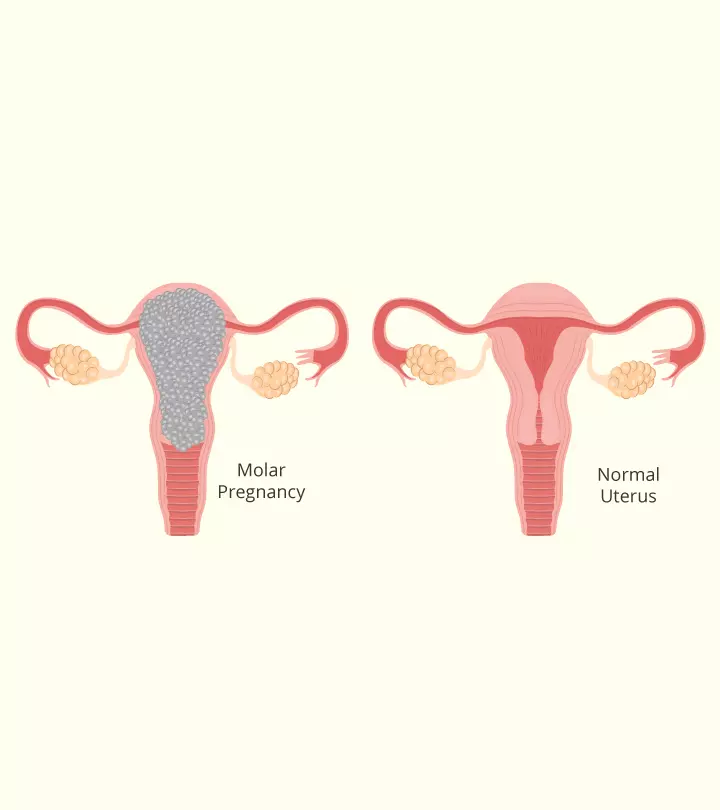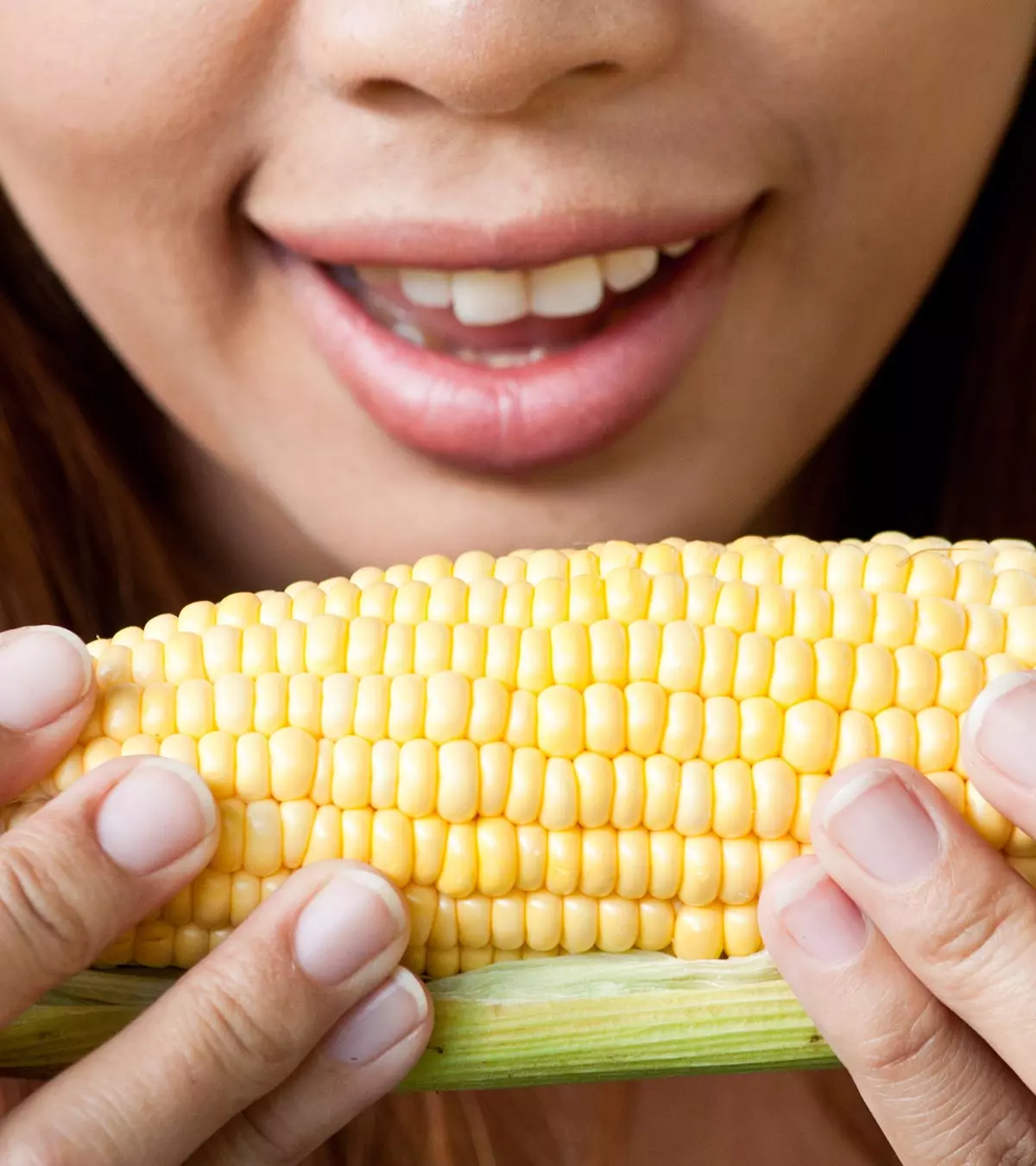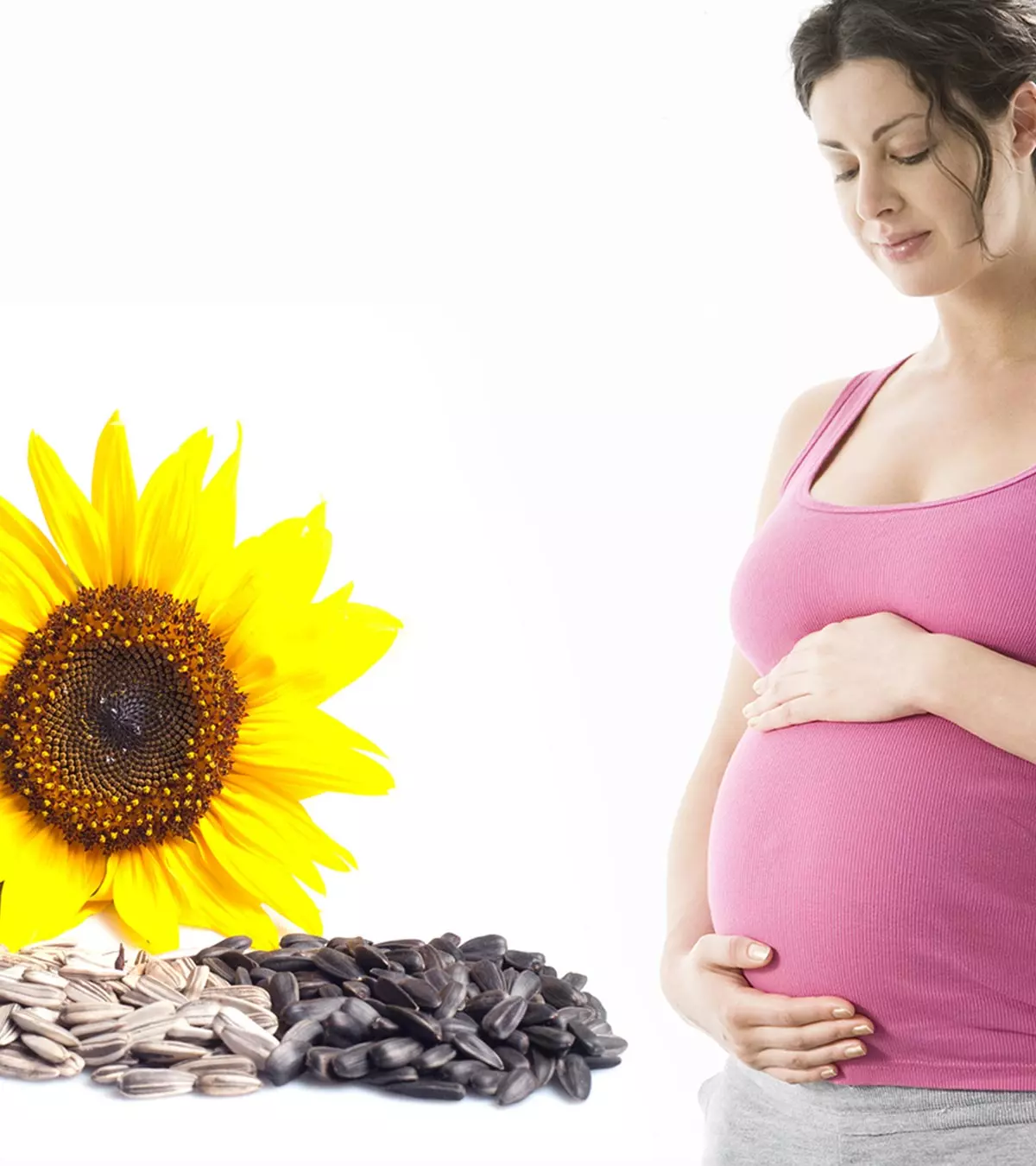
Image: MomJunction Design Team

Sunflower seeds during pregnancy can serve as a healthy, nutritious snack. The dried, roasted seeds are filled with nutrients to help your baby’s development and reduce the risk of developmental disorders. Besides, its high potassium content can aid in maintaining your blood pressure level. Sunflower seeds can be taken as delicious salty snacks or added to cakes, cereal, or pasta.
Read on to know about sunflower seeds, including their benefits, side effects, and some tasty ways to have them.
Key Pointers
- Sunflower seeds are a rich source of antioxidants, minerals, and vitamin E.
- Having sunflower seeds during pregnancy can help reduce the chances of blood clots and aid the baby’s development.
- Sunflower seeds are also a rich source of folic acid, an essential nutrient for pregnancy.
- You can have sunflower seeds in toasted form or add them to cupcakes or muffins.
- Overconsumption of sunflower seeds might lead to phosphorus toxicity and lead to complications.
Nutritional Profile Of Sunflower Seeds
Sunflower seeds contain vital nutrients and bioactive compounds that can contribute to your nutritional needs during pregnancy. One ounce (28.35g) of dry roasted sunflower seeds without salt can offer the following nutrients and be a valuable addition to your prenatal diet (1).
| NUTRIENTS | AMOUNT |
|---|---|
| Energy | 165kcal |
| Protein | 5.47g |
| Total lipid (fat) | 14.1g |
| Carbohydrate | 6.8g |
| Dietary fiber | 3.15g |
| Calcium, Ca | 19.8mg |
| Iron, Fe | 1.1mg |
| Folate, total | 67.2µg |
| Potassium, K | 241mg |
| Phosphorus, P | 329mg |
| Magnesium, Mg | 36.6mg |
| Selenium, Se | 22.5µg |
Source: US Food And Drug Administration
Benefits Of Eating Sunflower Seeds During Pregnancy

Image: Shutterstock
Numerous health benefits of sunflower seeds have made them a popular addition to pregnancy diets.
- Sunflower seeds are rich in nearly 90% of vitamins, phytochemicalsiBioactive compounds with antioxidant and anti-microbial properties found in plants. , protein, minerals, antioxidants, and polyunsaturated fatsiType of essential fatty acids required for the proper functioning of the cells, and brain and prevention of diseases. .
- Vitamin E in sunflower seeds acts as an antioxidant and protects your body from damage caused by free radicals. It also protects you from blood clots in the vessels.
- Phosphorus and minerals found in the sunflower seed aid the development of the bones of your unborn baby.
- The high content of potassium helps regulate sodium balance in your body. This helps in keeping down the high blood pressure levels.
- Phytochemicals in the seeds improve your immune system which weakens during pregnancy to increase the ability of the body to accept the growing fetus.
- Sunflower seeds and oil contain omega-6 fats which are good for your heart health and body and can be combined with omega-3 fats to improve the ratio of these fats.
 Quick fact
Quick factSunflower Seeds And Folic Acid
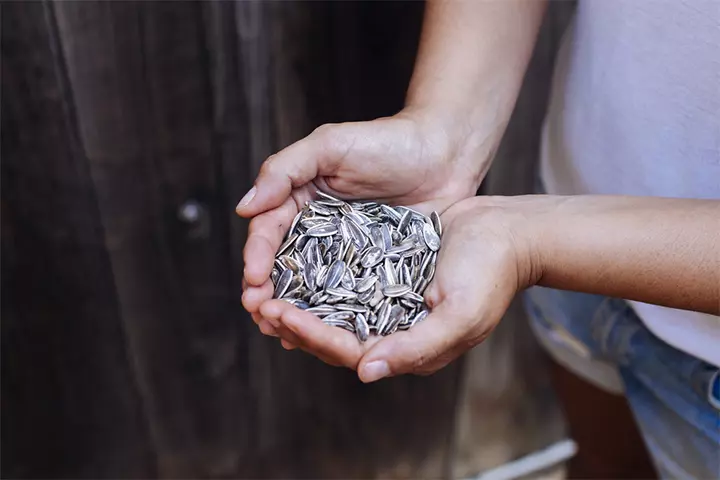
Image: Shutterstock
Sunflower seeds are a rich source of folateiThe vitamin B9 complex that is responsible for the formation of red blood cells and healthy cell growth. and different minerals like iron, calcium, magnesium, zinc, seleniumiAn essential mineral found in foods such as nuts, fish, and chicken, involved in thyroid, reproductive, and cell-protective functions. and copper.
- Folic acid in sunflower seeds helps in the formation of red blood cells and carries oxygen from the lungs to the different parts of your body.
- There is an increased requirement for folic acid in pregnancy. Therefore, sunflower seeds can be a great addition to your diet.
- Lack of folic acid triggers different problems like developmental disorders in your growing child.
Useful Serving Tips
You can easily incorporate sunflower seeds into your daily diet. Here are some interesting serving tips:
- Enjoy salted or roasted seeds as a choice of a healthy snack.
- To get a crunchy taste in your salads, you can sprinkle some roasted sunflower seeds and enjoy a new taste.
- Roast the seeds with cakes, muffins, candies or chocolates.
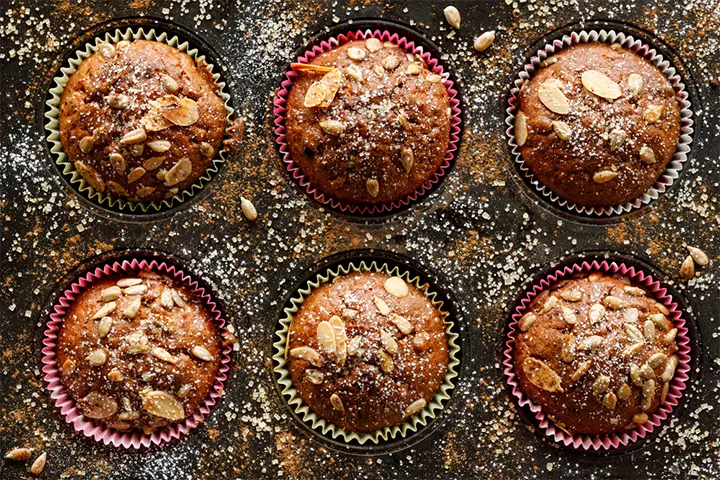
Image: Shutterstock
- Grind the seeds into powder and mix with your favorite pancake or morning oatmeal
- If you are allergic to peanuts, look for sunflower seeds that are sold as sunflower butter.
- You can add the seeds to steamed mushrooms and squash to prepare a side dish.
- Mix the seeds with tomatoes, peas, carrots, and peppers in a chicken broth and take it with rice or pasta.
 Quick tip
Quick tipRisks Of Eating Sunflower Seeds While Pregnant
Sunflower seeds are rich in nutrients that can pose health risks in pregnancy when consumed in excess. Here are some of the risk factors that you should be careful of:
- Consumption of high amounts of sunflower seeds can lead to phosphorus toxicity that may lead to kidney damage and non skeletal issues.
- You might suffer from selenium toxicity that leads to symptoms like selenosisiA condition caused by excessive intake of selenium mineral leading to symptoms such as hair loss, skin rash, and neurological problems. . Irritability and a fatigued body are common symptoms in this case.
- Too much sunflower seeds can also result in skin outbreaks and make your hair and nails brittle.
 Be watchful
Be watchfulRemember:
- Key to a healthy baby is good nutrition in pregnancy and incorporating healthy eating habits. A balanced diet packed with nutrition is the best way to head for a healthy and happy pregnancy.
- Ask your doctor if you can take sunflower seeds daily. If you get a green signal from him, you can safely consume it in moderation every day. Remember moderation is the key word here.
Frequently Asked Questions
1. How many sunflower seeds to eat per day during pregnancy?
It is recommended not to consume more than a handful of shelled sunflower seeds (about 30 micrograms) a day. Nonetheless, If you are apprehensive about consuming sunflower seeds in pregnancy, it is better to take a doctor’s opinion before consuming them (2).
2. How much folate is present in sunflower seeds?
Sunflower seeds are good sources of folate, and a cup of dried and shelled sunflower seeds is known to have approximately 225 mcg of folate (1).
3. Can sunflower seed allergies during pregnancy affect the baby?
No scientific proof exists that a sunflower seed allergy can be particularly dangerous to a baby during pregnancy. However, it is recommended to include sunflower seeds in moderation to your diet only after consulting your doctor and seeking medical attention at the first sign of an allergic reaction to prevent any adverse effects on your or the baby’s health.
4. What should I do if I have eaten too many sunflower seeds?
If you feel discomfort after consuming too many sunflower seeds, you may drink a lot of water to flush out your system, contact your healthcare provider to ask for further instructions, and ensure your body gets adequate rest (3).
While searching for healthy food items to consume while pregnant, you may have come across sunflower seeds and their benefits. But, can pregnant women eat sunflower seeds? These seeds could be a safe addition to your pregnancy diet when taken in moderation. In addition, sunflower seeds are rich in phytochemicals, dietary fiber, potassium, carbohydrates, folate, vitamins, and minerals required for a healthy pregnancy and fetal development and nourishment. You may add these seeds in salads, cakes, or have roasted seeds during snack time. However, it is good to speak to your doctor about the safety and side effects before consuming sunflower seeds during pregnancy.
Infographic: Benefits Of Eating Sunflower Seeds During Pregnancy
When consumed in moderation during pregnancy, sunflower seeds are a healthy snack option that can confer various advantages to expectant mothers. In this infographic, we present a sneak peek into the health benefits of sunflower seeds to give you subtle reasons to add these tiny, nutritious seeds into your pregnancy diet.
Some thing wrong with infographic shortcode. please verify shortcode syntax
Illustration: Best Benefits Of Eating Sunflower Seeds During Pregnancy
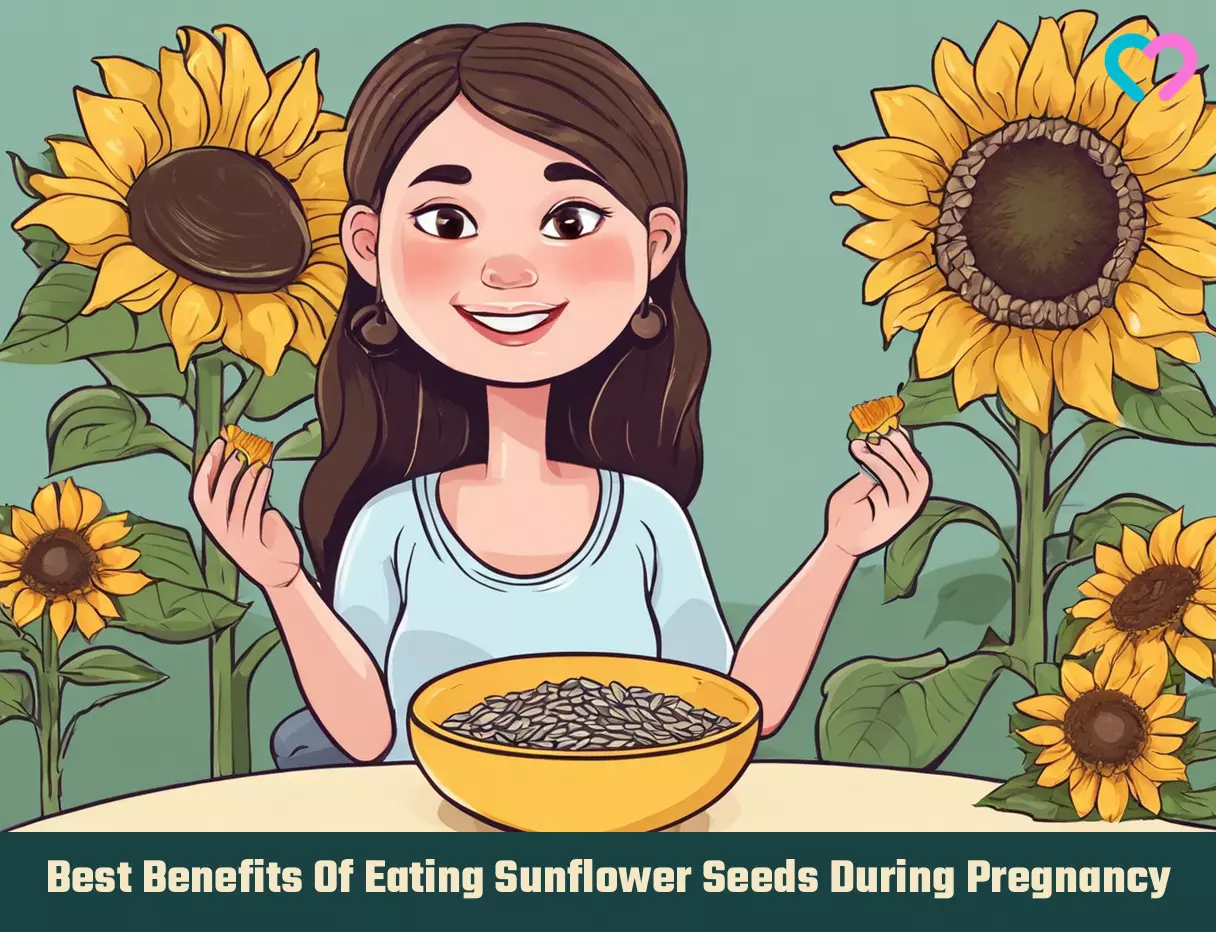
Image: Stable Diffusion/MomJunction Design Team
References
- Seeds, sunflower seed kernels, dry roasted, without salt.
https://fdc.nal.usda.gov/fdc-app.html#/food-details/170562/nutrients - Sunflower Seeds May Aggravate Acne.
https://nutritionfacts.org/blog/sunflower-seeds-may-aggravate-acne/ - Iqra Patoli et al.; (2025); Hypercalcaemia Caused by Sunflower Seeds and Calcium Carbonate Supplements; NCBI.
https://www.ncbi.nlm.nih.gov/pmc/articles/PMC8592659/ - Roles of Vitamin B in Pregnancy.
https://americanpregnancy.org/healthy-pregnancy/pregnancy-health-wellness/vitamin-b-pregnancy/
Community Experiences
Join the conversation and become a part of our nurturing community! Share your stories, experiences, and insights to connect with fellow parents.
Read full bio of Shivani Sikri
Read full bio of Rebecca Malachi
Read full bio of Swati Patwal
Read full bio of Dr. Joyani Das










